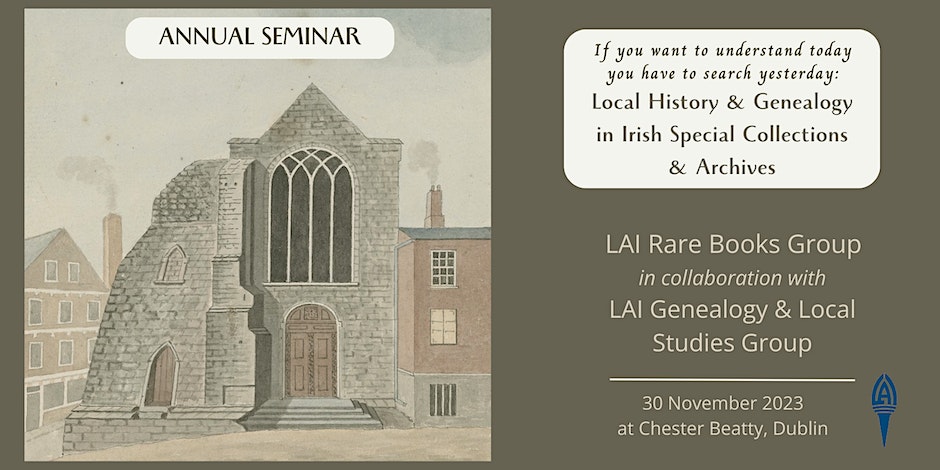
The #ebooksos campaign in Ireland by Stuart Hamilton, Marian Higgins and Cathal McCauley
Against the backdrop of COVID-19, this article outlines the ebooksos campaign. The origin and rationale for the campaign is described. Development of the campaign and possible future developments are considered.
Irish libraries, across all sectors, have responded superbly to the COVID-19 global pandemic. In the face of a constantly fluctuating public health context and associated restrictions, libraries innovated and adapted to continue to meet and exceed users’ needs and expectations. In addition to increasing the scope and diversity of library activities due to the emergency, many library colleagues also found themselves facing new challenges in the shape of operating community help lines, contact tracing and repurposing 3D printers to produce personal protective equipment (PPE). During this time of extreme uncertainty, and difficulty, one of Irish libraries responses was to significantly increase spending on ebooks. On the 26th March 2020, just 13 days into what could now be called Lockdown 1, the Irish government announced an additional €200,000 investment in e-books for public libraries and they injected a similar amount again in June 2020. Academic libraries have also ramped up spending on ebooks and welcomed the decision by many publishers in 2020 to make a range of content temporarily available at no additional cost. Unsurprisingly, given the sudden increase in availability and the reduced access to physical stock, ebook usage soared by up to 300%. The increased content was broadly welcomed by students, faculty and members of the public. However, library leaders like the undersigned authors and colleagues were worried about the sustainability of the approach and concerned about the fact that this increased dependence and spend on ebooks was highlighting the longstanding problems with the current models of ebook provision that predated COVID-19.
The #ebooksos Campaign
By the summer of 2020 the authors were discussing what we considered the perfect storm of financial pressures, a dysfunctional market and skyrocketing customer demand in relation to ebook provision. As we struggled with these issues the ebooksos campaign (https://academicebookinvestigation.org/) was gathering momentum in the UK and Research Libraries UK issued a content statement (https://www.rluk.ac.uk/rluk-content-statement/) in support of libraries. The ebooksos campaign started when subject librarian Johanna Anderson was unable to obtain ebooks to support a new flagship course at her institution. The few titles that were available as ebooks cost multiples of the print equivalent via third party platforms. To add insult to injury, the titles that were made available were sold directly to the school for an annual subscription – limiting access to a small group of students and removing the library from the relationship. Frustrated by this experience she started the ebooksos campaign with other colleagues including Caroline Ball and Rachel Bickley.
The UK ebooksos campaign’s primary objective is to call for an investigation into the academic ebook market. By early July 2021 more than 4,400 people had signed the open letter (https://academicebookinvestigation.org/) including the Library Association of Ireland, CILIP, senior university staff, eminent academics, student unions and many librarians. In parallel to this the campaign crowd sourced data to highlight the issues of concern. This confirmed that many ebooks are many times more expensive than their print equivalents, many titles are unavailable as ebooks and vendors apply a raft of onerous terms and conditions to ebooks that are available.
do with concepts such as ‘exploding licenses’. In addition to highlighting these problematic issues the call also suggested areas for action including more support for Open Educational Resources (OERs), copyright reform and – echoing the campaign in the UK – a call for these issues to be investigated by government and/or other relevant bodies.
The Campaign in Ireland
Building on the work of our UK colleagues the LAI drafted a call for action (Irish librarians call for action on the electronic content crisis facing libraries and library users – Library Association of Ireland) on what we called the electronic content crisis facing libraries and library users and, working together, the call was signed by four key representative groups: the Library of Association of Ireland who represent librarians and libraries in Ireland; the Irish Universities Association Librarian’s Group; the Technological and Higher Education Association Librarians’ Group; and the Consortium of National and University Libraries. This was an unprecedented cross-sectoral move which underlined the level of concern in libraries about these issues. This cross-sectoral dimension is an interesting difference from the UK campaign which started out with an exclusively academic library focus.
The key issues addressed in the call for action were the unsustainability of electronic content and ebook pricing and the objectionable terms and conditions under which they are made available. It is important to note that public libraries face even worse terms and conditions than academic libraries.
We followed up the call, again following the UK ebooksos example, by gathering examples of the kinds of issues we were concerned about and our data collection confirmed that some ebooks are 20 times more expensive than the print equivalent and many are 3 – 10 times more expensive. Interestingly, the data gathered suggested that the largest multipliers are applied by the large international publishers rather than the small local Irish publishers.
Gaining Momentum
The campaign attracted a great deal of attention from the outset. Webinars focusing on it have attracted over 500 delegates, librarians involved in the campaign have been asked to speak at many events, the BBC (University staff urge probe into e-book pricing ‘scandal’ – BBC News) ,The Guardian (‘Price gouging from Covid’: student ebooks costing up to 500% more than in print | Higher education | The Guardian), and many more organisations have written about it. IFLA interviewed (IFLA — An Electronic Content Crisis: Interview with the Library Association of Ireland) the authors about the campaign in Ireland. In the UK an increasing number of senior staff in relevant organisations and UK government departments are now interested in the campaign and the issues it is highlighting. During March and April 2021, ahead of planned meetings with Irish government officials, we engaged in a concerted social media campaign which was able to avail of the graphics prepared by our UK colleagues. In May 2021 a series of meetings were held with officials in key Irish government departments and agencies (including the Department of Rural and Community Development and the Competition and Consumer Protection Commission) about our concerns around ebooks and a similar process was underway in the UK. At the time of writing these processes were ongoing but at the very least have resulted in significantly increased levels of awareness of the challenges facing libraries and may result in national and/or European action to address them. In late May 2021 the UK campaign issued guidance for academics on negotiating contracts with publishers (https://academicebookinvestigation.org/2021/05/20/can-my-students-read-mybooks-guidance-for-academics-on-negotiating-contracts-with-publishers/). This guide offered practical tips for academic authors to consider when entering into contracts with publishers and flagged up some of the common pitfalls that lead to many ebooks being difficult and/or expensive to access. In July 2021 the ebooksos campaign, including the Irish component, was one of the central elements of the launch of Knowledge Rights 21 (https://www.knowledgerights21.org/) a nongovernmental organisation (NGO) funded by Arcadia and advocating for a twenty first century copyright and open access environment across Europe in the area of education and research.
Most recently, in August 2021, the International Federation of Library Associations and Institutions (IFLA) gave its support to the campaign and the IFLA Secretary General committed to write to the Competition and Markets Authority (CMA) in the UK urging that a market investigation into the issue is undertaken as a matter of urgency.
What can you do!
The Irish library community has rallied to the ebooksos campaign. The cross-sectoral support for it has been excellent. Individual librarians can help to sustain the campaign by signing the aforementioned letter at https://academicebookinvestigation.org/ and seizing opportunities to highlight the problems associated with most publishers’ current approach to ebooks. This could be in a meeting with academic colleagues to discuss publishing options, in a collection development planning session with library colleagues or when consulting with students and other library users. Colleagues who are active on social media should also consider highlighting the challenges
caused by current ebook pricing and associated issues using the #ebooksos hashtag. It is important that these issues are raised within libraries and beyond so that they remain in the spotlight that the campaign has successfully generated until acceptable solutions can be found.
Future Developments For many of us who worked through the transition from print to electronic journals in the 1980s and 1990s and the recent move to more open access publishing, the current situation in relation to ebooks is familiar. Then, as now, publishers resisted change for many years but when it did come it came very quickly. It is likely that the same pattern will be repeated on this occasion. Through our involvement in the ebooksos campaign we aim to ensure that the changes that will come will lead to a tangible improvement for libraries in the key areas of terms and conditions, pricing and licensing. Importantly, libraries must also continue to foster alternatives routes for knowledge dissemination including the use of open access book publishing (via for example university presses), open educational resources (OERs), controlled digital lending and other approaches. The promotion of such routes will have the dual benefits of reducing our over dependence on the traditional ebook publication process which has proven so problematic, and encouraging routes that will increase knowledge accessibility. Ultimately, we want publishers to play their part in the ebook market but to do so on fair, reasonable and sustainable terms.
Stuart Hamilton, PhD, Head of Libraries Development, LGMA, Marian Higgins, BA, HDipLIS, Past President of the LAI and Kildare County Librarian and Cathal McCauley, MLIS, CDipAF, ALAI, President of the LAI and University Librarian at Maynooth University
This atricles is taken from An Leabharlann 30–2 October 2021.
See more articles from An Leabharlann



